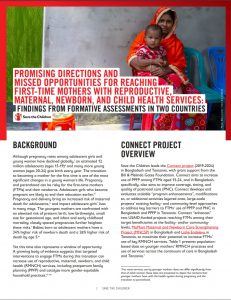
In many settings, young, first-time mothers (FTMs) face additional barriers that limit their use of reproductive, maternal, newborn, and child health (RMNCH) services, including postnatal care (PNC) and postpartum family planning (PPFP), and are vulnerable to poor health outcomes, including rapid repeat pregnancies. This brief describes findings from a formative barrier and facilitator analysis conducted in Bangladesh and Tanzania. The formative research used a participatory journey mapping approach to identify FTMs’ touchpoints with the health system for antenatal care, delivery, PNC, immunizations, and PPFP, and the factors that influenced their use (and often non-use) of these services. The brief describes windows of opportunity (and many missed opportunities) to reach FTMs with integrated services responsive to their needs, to foster supportive families and communities, and to support continuity of RMNCH care across the continuum of care.
Save the Children leads the Connect project (2019-2024) in Bangladesh and Tanzania, with grant support from the Bill & Melinda Gates Foundation. Connect aims to increase use of PPFP among FTMs aged 15-24, and in Bangladesh, specifically, also aims to improve coverage, timing, and quality of postnatal care (PNC). Connect develops and evaluates scalable “program enhancements”, modifications to, or additional activities layered onto, large-scale projects’ existing facility- and community-level approaches to address key barriers to FTMs’ use of PPFP and PNC in Bangladesh and PPFP in Tanzania. Connect “enhances” two USAID-funded projects reaching FTMs among their target beneficiaries at the facility- and/or community levels, MaMoni Maternal and Newborn Care Strengthening Project (MNCSP) in Bangladesh and Lishe Endelevu in Tanzania, to maximize their potential to increase FTMs’ use of key RMNCH services. Table 1 presents population-based data on younger mothers’ RMNCH practices and use of services across the continuum of care in Bangladesh and Tanzania.